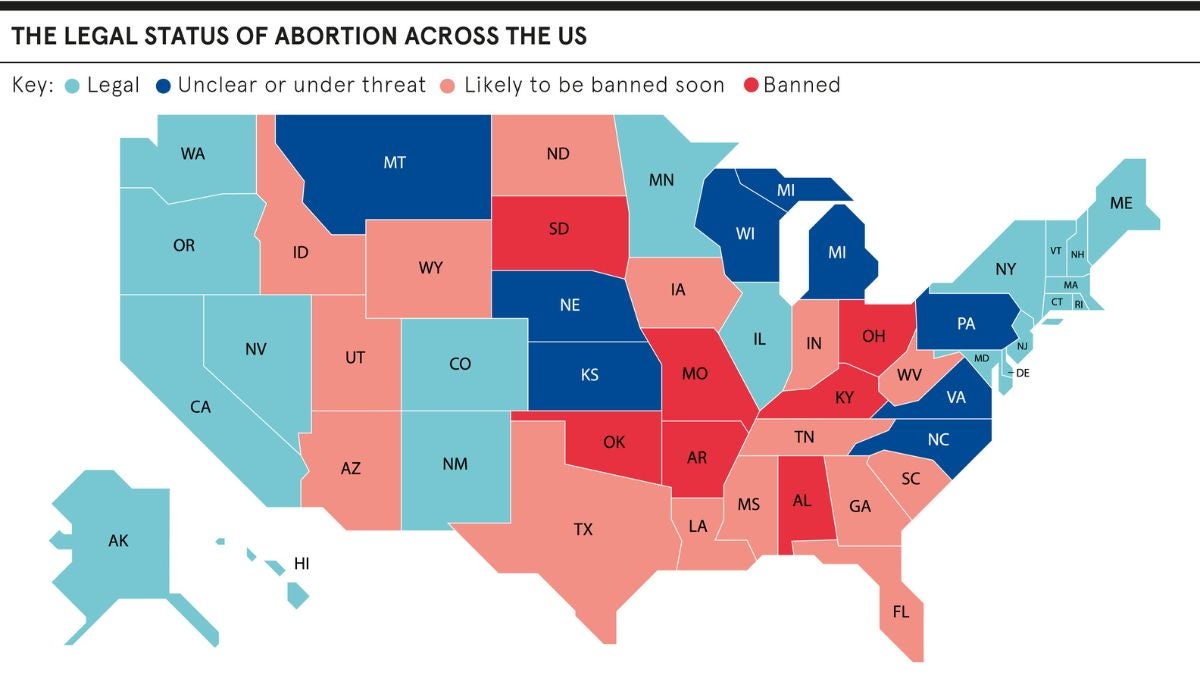
In the days following the Supreme Court’s ruling on Roe v Wade, which overturned the constitutional right to abortion in the US, a number of corporations rushed to promise support to employees.
Disney, Google, Starbucks, Yelp, Airbnb, Netflix, Patagonia and JP Morgan were among some of the first companies to promise financial assistance for staff who live in states impacted by the ruling, and who will now have to travel to access reproductive care.
Australian graphic design company Canva, which has offices in San Francisco and Austin, Texas, committed to covering the costs of travel and accommodation for its US staff and a person to support them when seeking abortion care.
Texas was one of the states to have a so-called trigger law, which would be effective 30 days after the Supreme Court reached its decision and would almost entirely outlaw abortion in the state.
A spokesperson for the company says: “We are deeply concerned by the Supreme Court’s decision to overturn Roe v Wade… Canva is committed to creating an environment where our team feels safe and supported in the personal choices they make for themselves and their families.”
The swift response from corporate America is admirable and both demonstrates these businesses’ commitment to women’s rights while providing some reassurance to their employees.
How can companies support staff?
Amanda Monroe, senior labor and employment associate at US law firm Michelman & Robinson LLP, says employers can provide support in myriad ways, including expanding healthcare plans and providing leave.
She adds: “Beyond that, we may see employers take on the risk of continuing to offer pre-existing travel and relocation benefits and/or expanding health benefits to include travel and lodging benefits for those seeking abortions.”

But employers should be wary of the potential legal consequences of helping. Monroe says that many will “need to consider the extent to which specific state laws restricting abortion may impact leave accommodations, healthcare plans and employment practices”.
Facebook parent company Meta was one of the companies to promise to reimburse out-of-state travel for those seeking an abortion. But it clarified in a statement to the New York Times that any support would only be to “the extent permitted by law”. The spokesperson added: “We are in the process of assessing how best to do so given the legal complexities involved.”
Could companies be caught aiding and abetting?
In some Republican states, aiding access to reproductive care has also been made illegal. In Texas and Oklahoma, for instance, anyone that is seen to be helping those get an abortion after the sixth week of pregnancy could be subject to a civil lawsuit.
Bloomberg Law states that such bounty measures “most clearly target employers” and allows citizens to sue anyone who is seen to be aiding and abetting an abortion. This could include paying for or reimbursing the costs of an abortion through insurance.
Mahir Nisar, principal at employment litigation firm Nisar Law Group, considers it one of the biggest potential legal issues surrounding the changes to abortion rights that employers will have to consider.
Adding to these legal complexities is the potential for employees to challenge companies that don’t extend their abortion policies to all. Nisar adds: “If employers do not apply their policy evenly, with respect to reimbursing employees seeking an abortion, they may be engaging in discrimination against that individual and not treating them fairly.”
For businesses with a presence in multiple states, offering support to staff working in states with aiding and abetting laws in place will leave them at risk of being sued. But equally, if their policies only apply to staff in certain states, they could be challenged on the grounds of discrimination. “This makes it somewhat difficult for companies to navigate,” Nisar says.
The importance of employee privacy in abortion cases
The other key consideration for companies adopting these types of policies will be privacy.
Monroe says: “Employee privacy remains paramount. Companies, especially those offering travel-related reimbursements for employees now required to travel out of state to obtain family-planning care, will have to balance the need for employee privacy relative to medical decisions and treatment against internal policies requiring proper documentation for expenses.”
Employers may have to revisit their current healthcare provisions or vacation policies to protect the confidentiality of staff. Monroe advises that organisations could consider expanding the list of medical treatments that are eligible for travel expense reimbursement and/or time off, to “avoid the potential exposure of sensitive and private medical information”.
To address this, companies can consider including all abortion-related care under their existing list of medical treatments that can incur medical-related travel expenses, such as rehabilitation or cancer treatment. This would allow staff to apply for a reimbursement, without having to specify the reason.
For those that can’t offer this to staff on their healthcare plans, LaDawn Townsend, founder of CEO advisory firm VOS Group, says: “There needs to be a way for the employee to directly talk to someone senior within HR, who can then communicate with the manager if there’s been an action taken or a service provided, without getting into the details.
“Organisations are really going to have to tighten up on their internal employee communications and human resource standards.”
Similarly, employers may consider removing the need to provide a reason when seeking leave for medical treatment. Nisar says: “A lot of employers are saying they don’t need to know the reason for the medical procedure but we’re yet to see how that works in practice.”
Roe v Wade: business leaders need to work on their response
As with any new legislation, there will be a period of adaptation for businesses. Townsend says: “Leaders need to make sure that they don’t put their head in the sand around this issue. The conversations around this are already happening in the workplace, so it makes for an odd work environment if we don’t address the elephant in the room, especially for those that have taken a public stance on their viewpoints.”
Although many companies were quick to pledge their support for employees in the wake of Roe v Wade, we are yet to see how many of the proposed relocation and reimbursement policies will work in practice.
Nisar claims that many of the responses from the corporate world could be seen as “branding” among companies that are keen to be seen to be “on the right side of history”. In his opinion, it will now be down to these companies to develop the proper policies to support women in their organisations and demonstrate that it is more than “performative allyship”.

In the days following the Supreme Court’s ruling on Roe v Wade, which overturned the constitutional right to abortion in the US, a number of corporations rushed to promise support to employees.
Disney, Google, Starbucks, Yelp, Airbnb, Netflix, Patagonia and JP Morgan were among some of the first companies to promise financial assistance for staff who live in states impacted by the ruling, and who will now have to travel to access reproductive care.
Australian graphic design company Canva, which has offices in San Francisco and Austin, Texas, committed to covering the costs of travel and accommodation for its US staff and a person to support them when seeking abortion care.
